If you can understand how to lower blood sugar naturally through diet, you can change your entire life – and really it all comes down to carbs, well a large part of it anyway.
There are 4 main components that influence blood sugar and A1C.
- Diet – healthy vs. unhealthy diet
- Macronutrients – Carbs / proteins/ fats
- Stress
- Lifestyle/ activity levels
We’re only going to cover the first 2 because we’re talking about diet. But just so you know, stress and lifestyle factors also play a part here.
DIET
Your diet has the single biggest influence on your blood sugar and A1C levels – it is absolutely critical in gaining good control and achieving good health!
So I hope you’ll learn some new things about your diet in this Carb Course that will help you get on track.
NUTRITION MYTHS
Nutrition myths are everywhere so we have to be careful. In fact, there are many nutrition myths that are deeply embedded in our society that we think are true, but they’re not.
For example, one of the biggest myths of all time is that it’s all about how many calories we eat. We’ve all heard it time and time again over the years that we need to reduce our calories and eat low fat to lose weight.
But this is a myth because not all calories are created equal.
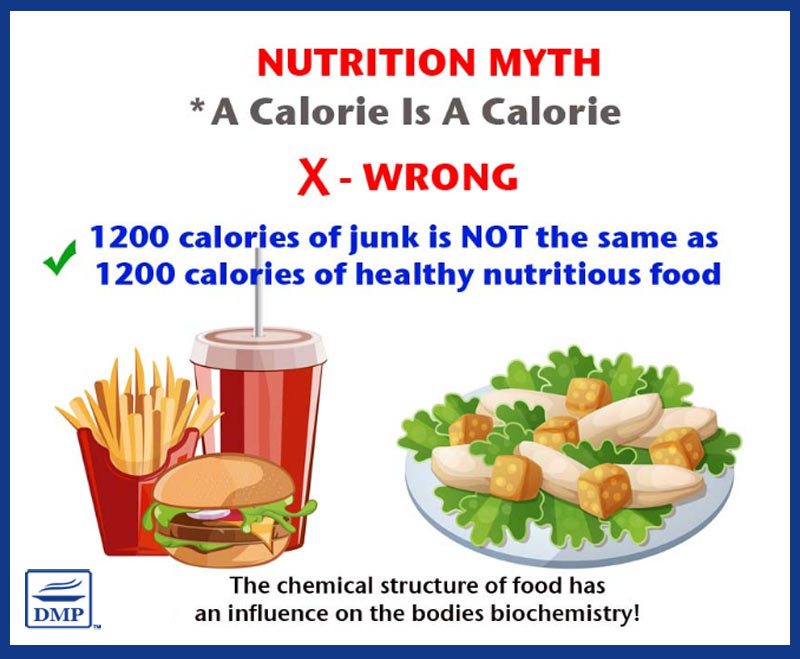
1200 calories of fresh natural unprocessed food is very different to 1200 calories of processed packaged food.
The most important thing is the food quality and the types of foods you eat.
If you’ve ever tried a calorie restricted diet and still struggled to lose weight, then it could have come down to the types of food you are/were eating.
Whole natural unprocessed foods are the types of foods that are supposed to make up a healthy diet, while processed packaged foods should make up a minimum. Over time, we’ve definitely lost our way and become too dependent on packaged and processed foods. Even foods we might think are healthy, often aren’t, which is what has got us all into trouble in the first place.
But we can change it!
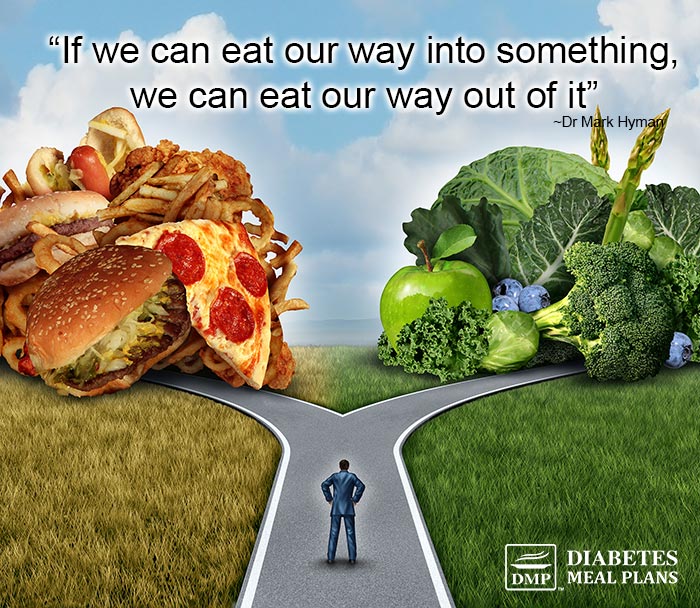
There’s a saying by Dr Barry Groves:
“Human beings are the only mammals smart enough to make their own food, and the only ones stupid enough to eat it.”
This is such a profound statement because although food products are given the safety approval, many of the additives and preservatives contained in them have not been extensively tested. We don’t know the interactions of using a number of additives and preservatives together. We don’t know the effects on the human body.
And given that the only thing that has drastically changed in the past 30-40 years is our food supply, then we can understand why our diet is to blame for much of our health decline. We can see the first hand effects of ‘processed’ food on us.
When it comes to food products, one important thing we have to remember is they are made by food companies that have one thing in mind – selling more products to the consumer!
So it really comes down to this…
HEALTHY DIET = REAL FOOD – unprocessed stuff your great grandmother would recognize.
UNHEALTHY DIET = FAKE FOOD – packaged and processed foods full of sugar, refined carbs, additives, preservatives, isolated food chemicals.
Changing your diet from fake food to real food will lower blood sugar levels naturally
When we eat natural, real foods, the way nature intended us to, then lots of things begin to change with diabetes. Less inflammation, more insulin sensitivity, lower blood sugar, more energy, better overall health.
This happens because your entire metabolic function begins to reverse. You’re providing fuel to your bodies cells in the way of real food – vitamins, minerals, fiber, phytochemicals, and compounds that help your body function like it should.
As Dr Robert Lustig says in this video: “We should rename diabetes the ‘Processed Food Disease’ because that’s what it is”.
Okay, occasionally there are other factors involved, genetics and so forth. But the major driver of the diabetes and obesity pandemic is processed food. And as Dr Lustig explains in this short video, it’s a social experiment that’s gone VERY wrong.
You really have to change the way you think about food, because for a large part of our lives we have been misled. Food companies and billions of dollars of marketing will continue to promote unhealthy ‘food products’ as healthy food sources, and this is simply not the case.
So it’s up to us to take charge and be in control of our own diet, nutrition, and health, which is clearly why you’re here.
MACRONUTRIENTS
Moving on from that let’s look at the influence of food on blood sugar and A1C.
We have 3 macronutrients:
- Carbs
- Proteins
- Fats
When you eat carbohydrates, this causes your blood sugar to rise, insulin to respond, etc, etc.
Here’s a simple graphic that shows how the body regulates blood glucose.
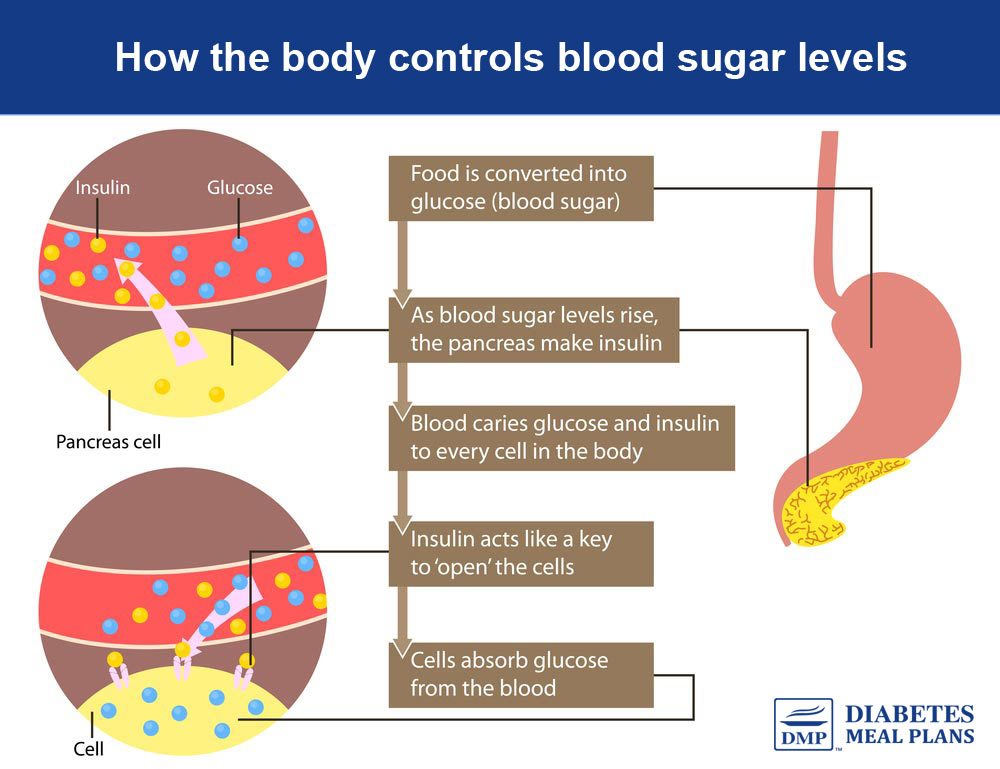
And here’s a simple video that explains how the carbohydrates we eat triggers insulin.
Blood sugar does get affected when you eat protein, but not to the extent that carbohydrates affect the response.
And as for fats, well they do not spike blood sugar or insulin at all!
Here’s an image that shows the response of the different macronutrients.
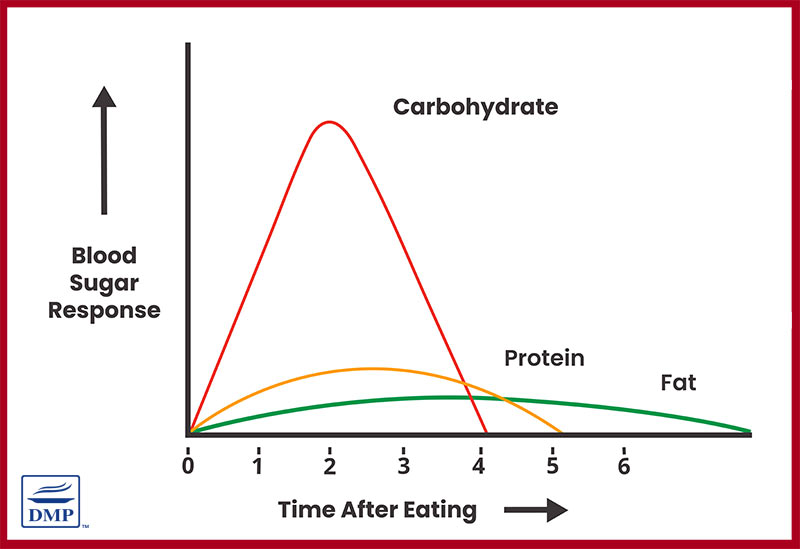
Whether we are diabetic or not, eating too many carbohydrates is the worst thing we can do for our health, period!
Most of the packaged and processed food items we have become accustomed to, are FULL of carbohydrates (and the worst kind). And essentially we’ve become carb/ sugar addicted!
HOW DO YOU LOWER BLOOD SUGAR NATURALLY WITH DIET?
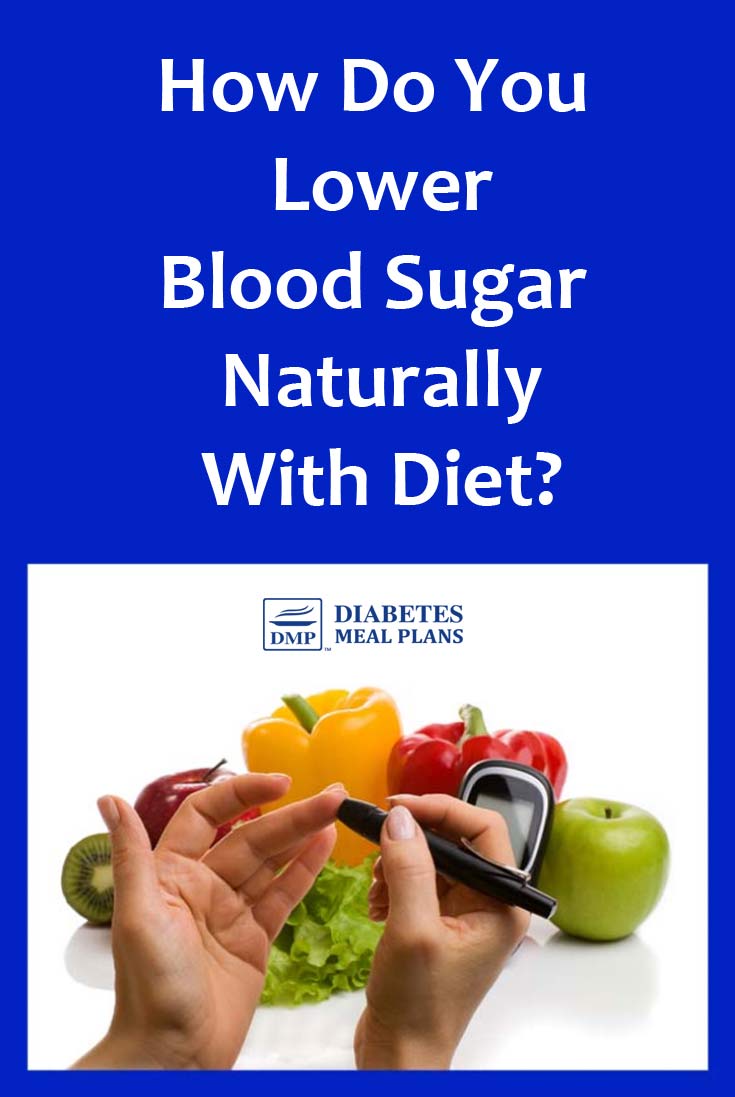
Researchers agree that the first approach to lowering blood sugar and A1C is to reduce carbohydrate intake.
You’ve already seen the influence that carbohydrates has on your blood sugar in that image above.
So it makes perfect sense that if you reduce carbohydrates you won’t be getting those big glucose spikes right?
If you don’t know what A1C is, it’s an average measure (given in %) of glucose in your bloodstream over the previous 3 month period.
Glucose/sugar attaches to a protein in our red blood cells in a process called glycosylation. The average red blood cell lives for around 3 months, so when they are doing this blood test they are testing glycated hemoglobin (blood).
So it makes perfect sense that if you reduce carbohydrates you’d have less glucose in the bloodstream to attach to the red blood cells, right?
And let’s not forget insulin.
Many type 2 diabetics have high insulin – they have high glucose (hyperglycemia) and high insulin (hyperinsulinemia) because the high glucose promotes high insulin production. And having both high glucose and high insulin promotes more insulin resistance.
So to help lower blood sugar naturally you need to lower your glucose levels, lower insulin production, and increase your cells insulin sensitivity.
How can you do that?
These are the 2 diet changes to focus on.
There’s also stress and exercise that are important too. But we’re here to cover carbohydrates.
Carbs, carbs, carbs – it’s all about our carbs. And unfortunately as a diabetic you have become carbohydrate intolerant.
Your body simply can’t tolerate the carbs anymore.
So it makes sense to lower your carbohydrate intake, right?
Right. And it works to help your diabetes in more ways than one!
RECAP: How do you lower blood sugar naturally through diet?
When you can focus on 2 things, great changes will occur – guaranteed!
- Carbohydrates – both the type and the amount
- Eating real food
Need Help To Lower Blood Sugar Through Diet?
Join our Members Community Today
Access weekly meal plans for ongoing inspiration.
Discover what to eat with our comprehensive food guides.
Explore our members library to improve your blood sugar and A1c with diet and foods.
Get support from our nutritionists and other DMP members.
CLICK HERE to view our membership options
References
http://www.diabetes.org/living-with-diabetes/complications/mental-health/stress.html#sthash.jybEnCEW.dpuf
Elhayany et al. 2010. A low carbohydrate Mediterranean diet improves cardiovascular risk factors and diabetes control among overweight patients with type 2 diabetes mellitus: a 1-year prospective randomized intervention study. Diabetes Obes Metab. 2010 Mar;12(3):204-9.
Esposito et al. 2009. Effects of a Mediterranean-style diet on the need for antihyperglycemic drug therapy in patients with newly diagnosed type 2 diabetes: a randomized trial. Ann Intern Med. 2009 Sep 1;151(5):306-14.
Gannon et al. 2004. Effect of a high-protein, low carbohydrate diet on blood glucose control in people with type 2 diabetes. Diabetes. 2004;53:2375-2381.
Feinman et al. 2015. Dietary carbohydrate restriction as the first approach in diabetes management: Critical review and evidence base. Nutrition. 2015;31:1-13.
Wheeler et al. 2012. Macronutrients, food groups, and eating patterns in the management of type 2 diabetes. Diabetes Care. 2012;35:434-445.
Hyman, M. The Blood Sugar Solution. Little Brown and Company. 2012.


Karen
Thanks for the suggestions on how to gain weight safely…am going to incorporate some of those tips!
Jedha: Nutritionist (MNutr)
You’re welcome Karen – glad you found them helpful.
Samantha
Being a UK pensioner I’ve been very grateful following your free help.
I was always big, always healthy, busy. Always jobs mostly 3 as I was a singer for 40 years. I didn’t know what a TV was😊.
I was in the food business. In fact I opened the first totally Organic restaurant in London. Traveled more than half the world 🌍 & never sat down!
My diabetes was brought on by a bad concussion.
Ive lost 5 1/2 Stone since the beghinig of this & never felt so awful. In the last 2 years I’ve become so unwell I have had to stop everything. I’m housebound & look like my grandmother not my mother. I’ve never been good on Diabetis meds & have tried so hard to reverse my type 2 diabetes. Without help it’s been a nightmare & now I feel too unwell to cook. No bread no pasta. No potatoes, no rice, I’m struggling to find quick comforting meals. I feel like a Rabbit! Was fine in the summer but now it’s cold. I’m cold, missearable & because I can’t feel my hands or feet, I’m laying all tge time. Sooo not me! Despite my not eating carbs or incredibly little or sugar the same., I’m so confused & defeated!
Thanx for your free help though. At least it confirms I’m doing the right things.
Sam
Emily - Dietitian (MS, RD)
Hi Samantha. I provided you with some recipe ideas on your other comment on the cottage cheese article. You may also find this article about healthy weight gain helpful if you are looking to regain your lost weight.
Stay diligent, even if it does not feel like you’re making progress you are fueling your body with the correct foods and that’s what matters. You may want to discuss the cold hands and feet with your doctor– this could be the start of some circulatory issues secondary to diabetes. Unfortunately there isn’t a way to reverse most diabetic damage, but the only want to slow the progression is gaining good control over your blood sugars as soon as possible.
Sabina Chou
Thanks for sharing. I remember that cinnamon was meant to lower blood sugar levels. Might have to try in my nighttime milk as I cannot get my fasting levels under target.
Emily - Dietitian (MS, RD)
Cinnamon works great for many people! Also, make sure to check out this article for some additional tips on lowering blood sugar in the morning- a fan favorite is taking some apple cider vinegar and cheese prior to bed. Let us know if any of the suggestions make a difference for you!
Debby
We should rename diabetes the ‘Processed Food Disease’ because that’s what it is”.
Wow! I know that processed foods are not good for me and that I am sensitive to a lot of the additives etc… But I never associated diabetes as a processed food disease. DUH… I am so addicted to crunchy salty carbs that I actually crave them and think about them all day like i used to crave cigarettes. Thank you so much for this start, you have given me so much to think about!
Jedha
Great stuff Debby! Thinking about things from a different perspective is the first step toward change. Addictions are amazing like that! They can be overcome though, one step at a time.
steph
Hello Jedha. I discovered via an unrelated blood test that I was pre-diabetic about six months ago. My sister is Type 2 and injects twice daily. Although my diagnosis was an initial shock, I have since done lots of research and have become convinced by monitoring my BG levels that I can control my levels by diet- I have also lost some weight even though it was not necessary. I follow the high fat – low carb-type diet and my question is how will my colesterol levels be affected by this?
Jedha
People usually see an improvement in cholesterol levels Steph. Despite commonly held assumptions, the cholesterol and fat you eat has very little to do with the levels of cholesterol in your body. We have some very detailed info on this coming on the blog in a few weeks, so keep an eye out for it.
Lori
I would have signed up for the 30 days but I see that I can’t get all of the information at one time. I don’t like getting the info doled out a little bit every day for 30 days.
It makes it a little hard to plan ahead.
Jedha
Sorry Lori but due to the nature of the program we’ve found it does work best this way. Unfortunately we can’t please everyone.
Patricia de la Salle-Hawreschuk
HELLO
I have Type 2 diabetes and really like your plan, but do not have the money to afford it, I am on a fixed income with very little to live on,and stressed out to the limits and on top of that I have a mechanical heart valve and am on coumadin , and have the condo board from hell.
Hey nice to be able to whine
Patricia de la Salle
Jedha
You’re welcome to have a whine anytime Patricia. There are plenty of great resources we share for FREE, including our weekly newsletter which always contains information to help everyone. Welcome to our community.
Suni
I have always wanted to change my eating habits. It is more expensive and time consuming. Stress has always played a major part in just picking something up and getting it over with. Now I am paying for it. I watch and read and I can see just how long I have been set up to be like this. At 57 it really wasn’t a shocker to come up diabetic just this month. Now i am looking for the good in having diabetes. i am forced to make a change, educate myself, and eat correctly. I am still a newbie at this still trying to find my Boundaries. It will come. it is a challenge. i was very surprised today when i had to weigh in at the doctors. i have already lost 12 pounds. seeing the success in a few weeks has also shown me that i was killing myself. now being Diagnosed, i have more motivation.
Jedha
Congrats on the changes you’ve made and your success so far Suni. You’re right, in some ways diabetes is a blessing in disguise. Sure it’s challenging but it does force you to get and stay motivated to look after your health and that’s a good thing. Glad you found us and look forward to hearing more. :)
Corina
This was great! I learned so much. Thank you
Susan
Your statement about being carbohydrate intolerant really resonated with me.
I went to the doctor about a month ago feeling run down, achy, irregular heartbeat, unable to sleep through the night. He sent me for a blood test and a week later I was back in his office to be told that I have T2 diabetes. He said that rather than put me immediately on medication he wanted to give me 6 months to lose 20-25 lbs. and then retest.
The only dietary advice he gave me was to look for the “sugar hits”, things like desserts, sodas, bread, etc, and try to eliminate those. That was kind of a no-brainer for me, I felt so awful and those things made me feel worse. I was scheduled for a couple of weeks of travel right after so it wasn’t easy. I ate a lot of fast-food salads over those two weeks, fruit to satisfy sweet cravings, and drank plenty of water.
I’ve always cooked most of our meals at home and enjoy trying new recipes, so I started researching new ways to eat, which is how I came across your site. Everything I read here fit with what I was experiencing. Thanks so much for what you are doing. I’m learning new things every day and looking forward to making my way through this course.
Jedha
Welcome Susan! It’s always surprising to learn how little information people are given. Glad you landed here and look forward to hearing you bring everything back on track.
Clara
Hi Is there a special diet based on the blood group. My daughter has O+ blood group. So many foods which are meant for diabetes are raising her sugar levels. Stevia also raised her sugar level. How can I help her.
Jedha
Hi Clara,
I don’t think there has ever been any real evidence behind the blood type diet!
It’s not uncommon that people react to things like stevia, everyone is different. I guess the best thing to do is focus on all the foods she can eat without raising blood sugars too much and create a meal plan around that. There are tons of foods to choose from.
Rachel
I have had type 2 for about 4 years now. For the first few years I was on numerous meds and not seeming to get anywhere. In August of 2015 my daily levels were well into the 200’s, I was sick all the time and just miserable. Then one day a light bulb came on. I since then have lost over 30 pounds got my levels into the 90’s, and have gotten myself off all meds. My fasting sugars are usually a little higher, and past few weeks I have been sick and under a lot of stress which has caused my levels to spike quite high, even without eating carbs. Just trying to get through that right now. But it can be done, and once you get into the habit of eating healthy it becomes natural and easy.
Jedha
Thanks for sharing your great results Rachel, it’s very inspiring :)
There is hope for everyone, but it’s funny how we just need that light bulb to come on right?
I hope you get well soon. Make sure you relax, try to get that stress under control and everything should fall back into place. Take care of you :)
Brewster
Re: the numbers here in Canada the fasting range is 4-7 and the after meal two hour max is 10.
Jedha
Hey Brewster, the numbers are stated the same for the entire world, it’s just that some countries are in mg/dl and some mmol/l – we list both when we state numbers. The two hour max to aim for is always under 7.8/140, it should be a goal to keep numbers under than at all times.
Sharon
I have diabetes for a number of yrs,,and never ate how I should,,I’m very lucky I haven’t loss a leg,,,or my eye sight,,,I’ve learn so much in the few lessons,,looking forward to more and doing the meal plan after,,thank you
Jedha
Hi Sharon, nice to meet you.
Well maybe now is a good time to start taking better care of yourself. Glad you’re finding the info helpful and look forward to hearing how you go. :)
Libby
Wow thought Dr Robert Lustig was great and real about it all. Your page, diagrams easy to understand. We seem to have different number systems to you e.g 130 to 140
our numbers are like 6.1 same with weight we have kilos not pounds. Very much looking forward to learning and understanding more. Great job. Libby
Jedha
Hi Libby :)
Dr Robert Lustig is AMAZING!!
One of the great people out there crusading for better health and responsible nutrition – as he calls it.
Here at Diabetes Meal Plans we try to include both mg/dl (100, 130 etc) and mmol/l (5.5, 6.1 etc.), and also pounds and kilos because we like to cater to everyone worldwide.
Enjoy :)
Patti
I have been following your blog. My husband has been struggling with diabetes fro a few years. I’m looking forward to the course.
Jedha
Hi Patti, I’m sure you’ll learn loads of things to help make eating easier for you both. If you need tips for your personal situation, be sure to ask along the way. :)
Dennis
I along with several from Diabetic Connect are already doing low carb and high fat diets along with fasting. Many of us have been having great success lowering our blood glucose levels. I was on insulin and have improved to where I hardly have to take insulin to keep my BG down. I have recorded over 2 months of great readings and I have blood work scheduled at the end of this month. I can’t wait to see how my A1C has improved. Several people on that site have been doing this for years, and at first I was skeptical and the more I studied fasting with the LCHF diet the more I could see the significance of the study. So I joined in and haven’t regretted it since. I already had much damage from having uncontrolled high blood sugars, and can’t afford more.
Jedha
Thanks so much for sharing Dennis, how exciting!! What great results!!
I hear and see stories about these type of results all the time too, which is why we are so passionate about sharing a low carb diet. I can’t wait to hear about your A1C results, so be sure to check back in and share. Perhaps you’d even like to share your story on the blog to inspire others. :)
Gloria
Very interesting. I find myself leaning more to home cooking. My problem is this during the day and before I go to bed my numbers go from 88 to 123 daily but my fasting numbers always from 130 to 140. I lost 27 lbs by changing my eating habits. I am hoping to learn how to conquer my fasting numbers. One question if not saccharine what is the alternative.
Jedha
Hey Gloria :)
That’s so great, home cooking is where it’s at and it’s not as hard as most people think. We’ll be adding a whole range of virtual cooking classes to our Members Club soon.
Your numbers are actually pretty good and congrats on the weight loss – amazing what eating can do right. :)
Have you tried a slice of cheese and a tablespoon of apple cider vinegar before bed? Many people find that helps lower morning highs, and research shows it works too. https://diabetesmealplans.com/5087/high-blood-sugar-in-the-morning/